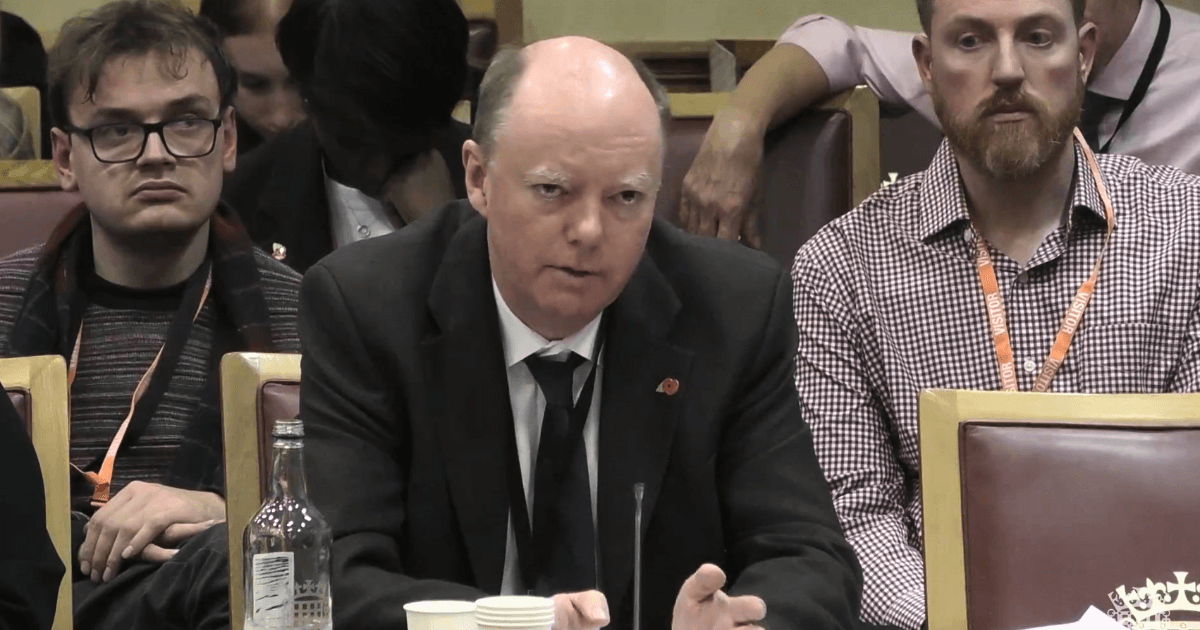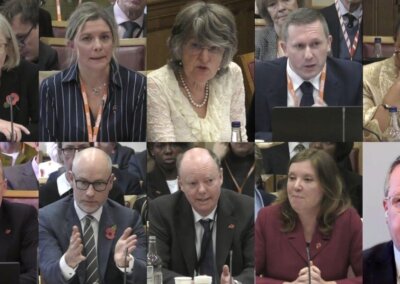The Chief Medical Officer (CMO) for England, Chris Whitty, has suggested that attempting to talk a loved one out of having the state assist them in suicide is “coercion”, prompting a backlash from commentators who have suggested this is a direct attack on national suicide prevention efforts.
Yesterday, during the House of Lords assisted suicide Bill select committee, Professor Sir Chris Whitty was called as an expert witness to give evidence on the Bill. In response to a question about coercion and pressure, Whitty said “I’ve got the impression that people think that all coercion is due to people doing it for nefarious reasons. Actually, you also get coercion, including from family members who, in their own view, are doing their best for a relative they see is in distress and are imposing their views on the individual who themselves may have a different view”.
He went on to say that “the whole point of people having adequate consent as an adult is that, provided they have capacity, they should be taking the decisions”.
“Ultimately, it’s [the decision of the person who desires assistance in suicide], and you do need to be alert to this form of coercion”, he added.
The pro-assisted suicide Peer Baroness Hayter made the same point, saying, “We use coercion as if it’s always towards death – it can be exactly the opposite way”.
A number of commentators and public figures have taken serious issue with his comments, suggesting they run counter to suicide prevention efforts. Commentator Adam James Pollock said “Trying to stop a loved one from killing themselves is ‘coercion’ and ‘imposing’ your view on them, according to Chris [Whitty]”.
“We are a nation that values suicide prevention, and individuals like this seem hell-bent on tearing that down. Evil”.
Responding to Whitty’s comments, Anglican priest, journalist, and broadcaster, Giles Fraser said “The dark ideology underpinning the belief that the state should [be] assisting people to kill themselves is a belief in radical autonomy. This is where the darkness begins”.
He later added “If someone is standing on a ledge wanting to throw themselves off, Chris Whitty thinks trying to dissuade them is coercion. This is absolute moral madness. These suicide cheerleaders have no idea of the chaos they have just unleashed”.
GP Dr Katie Musgrave said “No, Prof Whitty, I think you are confused. When my mum or dad says, ‘I’ve had enough, I want to die,’ I am not ‘imposing my views’ on them by holding their hand and telling them ‘it’s OK, I love you & am here with you'”.
“That’s not coercion – never coercion – it’s love”.
Lord Moylan also took issue with Whitty’s comments saying “Only a complete loss of moral compass, a failure to understand what makes us human and what degrades, an inability to see the world the right way up, can account for such a view, for making such an equivalence”.
Baroness Fox responded to Whitty’s comments saying “‘…clearly doesn’t believe in suicide prevention’. Or LOVE”.
One X user even said that, were the assisted suicide Bill to pass, and it to become illegal “to engage in suicide prevention efforts”, he would “willingly break the law and, if necessary, be prepared to go to prison for it”.
Pro-assisted suicide MPs say talking someone out of assisted suicide is coercion
This was not the first time supporters of the assisted suicide Bill have suggested that attempting to persuade someone not to end their life by state-assisted suicide is a form of coercion.
During the debate at Second Reading on 29 November last year, Bill sponsor Kim Leadbeater also suggested that the true source of coercion arose from family members who tried to prevent someone from choosing assisted suicide.
In the debate, Independent MP Richard Burgon made an intervention about the possibility of people being coerced into ending their lives. In response, Leadbeater said “Evidence from other jurisdictions shows clearly that coercion tends to happen the other way; what tends to happen is that families try to prevent the person from making the choice of an assisted death”.
Similarly, in an interview on Sky News the day before Second Reading of the assisted suicide Bill, Labour MP Cat Eccles claimed that, in those jurisdictions in which assisted suicide is legal, coercion “actually happens with relatives trying to talk loved ones out of having an assisted death”.
The presenter, Kay Burley, said “People who are against [the Bill] come on the programme and say to me, [they are] worried about people being coerced by relatives and loved ones into doing something that they perhaps don’t want to do”.
Eccles replied, “Yeah well actually the evidence we’ve seen from other countries that have introduced assisted dying laws is that the most coercion that actually happens [is] with relatives trying to talk loved ones out of having an assisted death”.
The House of Lords select committee on assisted suicide came to a close this week, and the Bill will enter the House of Lords again for Committee stage on 14 November.
Spokesperson for Right To Life UK, Catherine Robinson, said “Whether or not he recognises it, Whitty is essentially arguing that suicide prevention efforts, at least in some circumstances, are wrong and even amount to coercion. This is a deeply perverse perspective, and a total false equivalency between coercion to suicide, a real risk under the Bill, and the commendable attempt to persuade someone not to end their life by suicide, whether or not it is state-assisted”.
“At the heart of the argument for assisted suicide is the idea that some suicides are okay and ought to be facilitated. But this is not true, and we should not facilitate suicide at any stage”.
“The Chief Medical Officer ought to be ashamed of his comments and would be well-advised to stick to topics on which he is more knowledgeable”.












